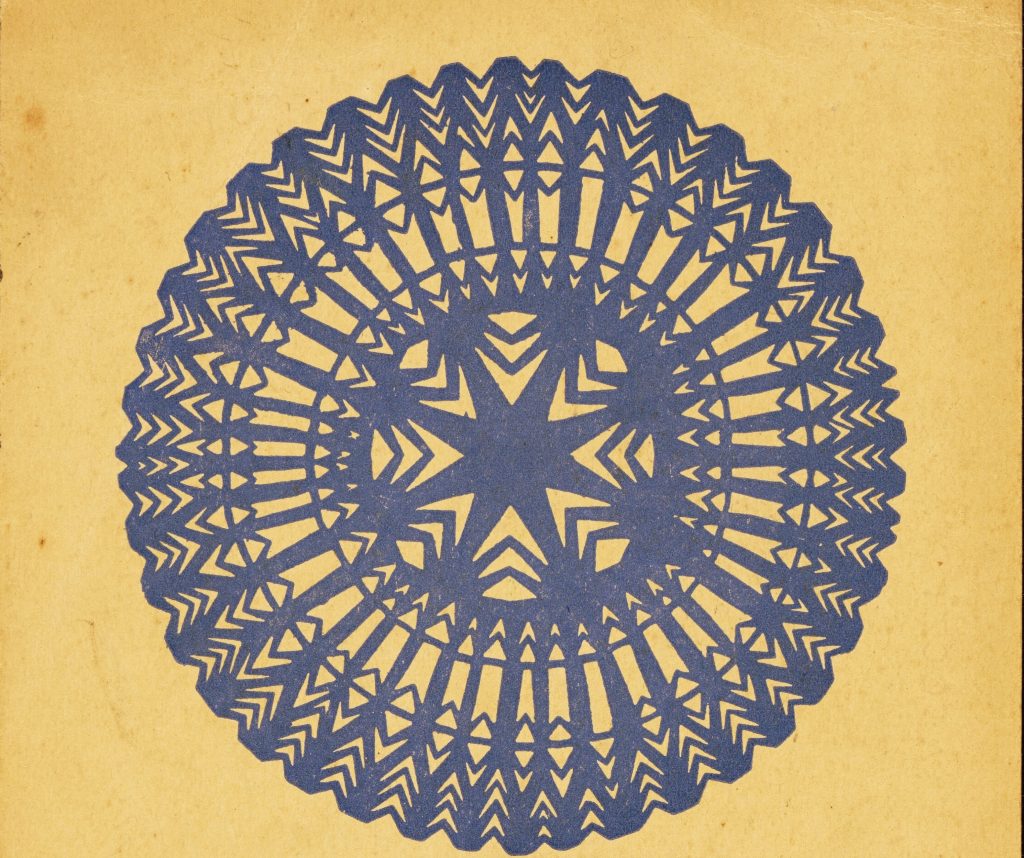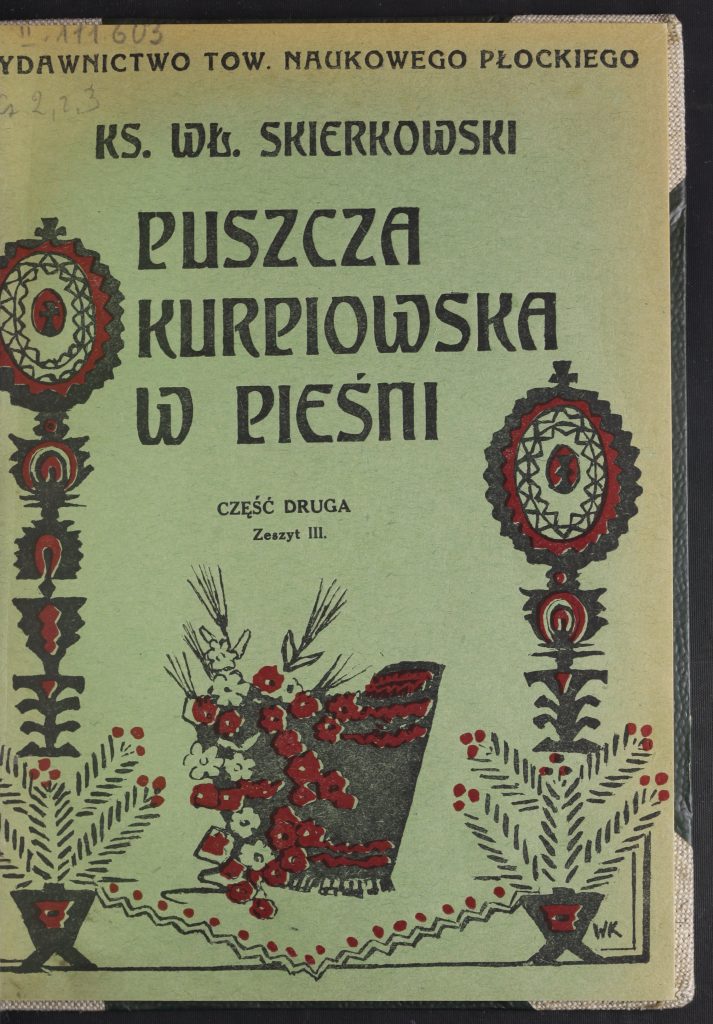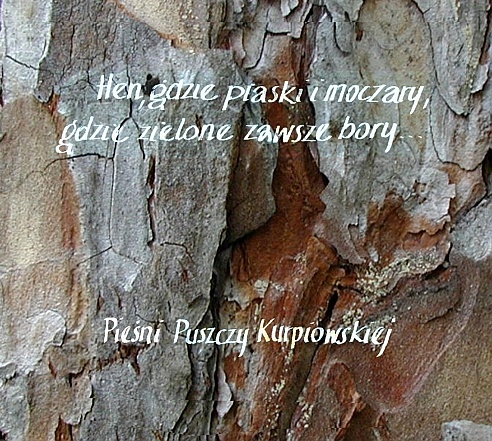Kurpie Forest Songs
|
The month of August marks both the birth and death of the Reverend Władysław Skierkowski – a highly meritorious figure for the folk culture in the region of Kurpie. While commemorating the life and work of this outstanding personality, we will also have a glimpse of what the Kurpie folklore looks like today. Kurpie lies in the north-eastern part of the province of Mazowsze (Mazovia). It is an extremely interesting part of the country. Contrary to the rest of Mazowsze, the wealth and prosperity of the region was never preponderantly reliant on farming, as most of the local people worked as beekeepers, fishermen, pitch burners and coal merchants. Some of them were even engaged in the excavation of amber from damp meadows. Vast areas of meadows and forests make up the local Primeval Forest, whose inhabitants made a name for themselves by bravely fighting the Swedish invaders in the seventeenth century.  Kurpie-style cutout from Kadzidło, Nowogród : Wydawnictwa Oddziału Kurpiowskiego P. T-wa Krajoznawczego, [1933] ([unknown place : unknown printer]). Source: Polona. Kurpie Primeval Forest in song and a musical priestThe Reverend Władysław Skierkowski was born on 12 August 1886 in the village of Głużek near Mława and died in the German concentration camp Soldau in Działdowo on 20 August 1941.  The Reverend Władysław Skierkowski, Puszcza Kurpiowska w Pieśni (The Kurpie Primeval Forest in Song), Płock : Wydawnictwo Tow. Naukowego Płockiego, 1934 (Płock : B-cia Detrychowie), source: Polona Skierkowski was a musically gifted child fascinated with the music performed by village musicians and when he was appointed in his adult life as a vicar in Myszyniec, he was immediately taken by the local Kurpie songs: My joy had no bounds, when I heard the sad, as only that Kurpie Primeval Forest can be, and expansive, just like the local dark forests, and yet the pleasant and familiar, and so strangely touching, tune of the song Leć głosie po rosie [Fly, oh voice, over the dew]. I did not hear the words of the song, but the melody and the refrain “ola lola…” rang in my ears. Then the voice of the singers gradually faded away until it eventually died down in the darkness of the forest, while I listened intently hanging on to the sounds of the fading melody and thinking: My God! how grateful I am to You for having put me in such an interesting land Władysław Skierkowski, Puszcza Kurpiowska w Pieśni (The Kurpie Primeval Forest in Song), 1928, p. 9. His fascination soon turned into a hobby. In his free time, the reverend picked up and jotted down the songs, noted down proverbs and described the rituals. In the meantime, he learnt the Kurpie dialect. In the subsequent years, he was transferred to other parochial centres but he always came back to Kurpie during summer holidays. In 1928, he brought out the first volume of his collections titled Puszcza Kurpiowska w pieśni (The Kurpie Primeval Forest in Song), which amidst certain controversies arising from the method of notating the local songs has served as an indispensable source of this traditional repertoire. Inspirational folklore The Reverend Skierkowski has not been the only one fascinated with songs and tunes from Kurpie. It is enough to mention Karol Szymanowski, who took advantage of and creatively arranged the material gathered by the Myszyniec vicar. The results of these efforts bore fruit in his choral Sześć pieśni kurpiowskich (Six Songs from Kurpie) and Pieśni kurpiowskie (Twelve Songs from Kurpie) for voice and piano. There have been other composers who drew on the Kurpie folklore. Tadeusz Baird is the author of Mała suita kurpiowska (Little Suite from Kurpie) for string orchestra and Tadeusz Maklakiewicz wrote Suita Kurpiowska (Kurpie Suite) for solo soprano and mixed choir a capella. Forest singing What was it that so attracted the song collectors (Adam Chętnik was another passionate local music lover) and composers to the Kurpie repertoire? The Kurpie songs exhibit characteristics of the so-called forest songs. Amongst other songs found in the province of Mazowsze, they stand out on account of their tonality (a bulk of them are pentatonic and several have a narrow ambitus) and a frequent occurrence of the quintuple metre (almost non-existent elsewhere in Polish folk music), in addition to rich embellishments. They also reveal the archaic feature of apocope – a term introduced by ethnomusicologist Jan Stęszewski. Apocope in music consists in breaking, quietening or hinting at the last syllable of a word. Kurpie songs also featured a whispered anacrusis, which was brilliantly performed by the famous singer Stanisław Brzozowy (1901 – 1983). Born in the village of Krobia, the artist was a professional farmer and hunter but his biggest passion was singing: Whenever I pointed something out, he came up with a suitable song; when I was riding a horse, he had a horse’s song at hand; when he saw me grazing a cow, he sang a cow’s song for me Piotr Dahlig Stanisław Brzozowy (1901 – 1983) jako klasyk wśród śpiewaków ludowych [Stanisław Brzozowy (1901 – 1983) as a folk music classic], in : Przegląd Muzykologiczny No 3, 2003, p. 17. Other well-known local singers include Waleria Mierzejek (1874 – 1960) and Waleria Żarnochowa (1908 – 1988). The latter sang songs for the Reverend Skierkowski when she was a young girl. Her songs were richly embellished and she herself admitted that „a forest song must be tweaked and twisted”, in other words it had to contain multiple klulasiki (embellishments). Żarnochowa was also a folk poet and in her later life she directed a children’s ensemble. Her recordings are stored in the archives of Polish Radio and the Phonographic Collection of the Institute of Art, Polish Academy of Sciences. They may also be heard on this CD album:  A CD album with archival recordings of music and songs from Kurpie, source: the Institute of Art, Polish Academy of Sciences. Kurpie in the twenty-first centuryAnother artistic enterprise dedicated to the music from Kurpie is the duo of guitarist and composer Rafael Rogiński and singer Genowefa Lenarcik, the daughter of singer Stanisław Brzozowy. Genowefa Lenarcik now lives in Słotwiny, Lubelszczyzna (Lublin Land), where she moved with her husband, but she still sings in the Kurpie style. She is also bold and brave in the typical Kurpie way: her duo with Rogiński is a very modern and avant-garde project. Let us listen: Yet another extremely interesting artistic project inspired by Kurpie music, including both Skierkowski’s documentation and archival recordings, is a project initiated by ethnomusicologist Weronika Grozdew-Kołacińska, Etnofonie kurpiowskie. Tribute to Szymanowski and Skierkowski. |



